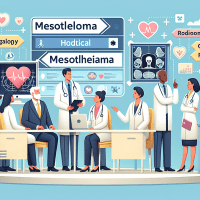Mesothelioma Patient Resources: A Personal Journey of Hope and Support
Hello, I’m a registered oncology nurse with over 10 years of experience, and this blog is my heartfelt effort to share comprehensive, compassionate Mesothelioma patient resources. I understand the emotional and physical challenges you face, and I’m here to provide clear, supportive information on diagnosis, treatment, and emotional care so that you never feel alone during this journey.

Understanding Mesothelioma: Diagnosis and Staging
Mesothelioma is a rare, aggressive form of cancer affecting the lining of the lungs, abdomen, or heart. The diagnosis of this disease often begins with tests such as thoracoscopy or thoracentesis. These procedures help us obtain tissue samples, which are then analyzed under a microscope to confirm the presence of cancer cells.
Mesothelioma Biopsies Explained
I know that procedures like thoracoscopy (minimally invasive surgery using a small camera) and thoracentesis (fluid extraction from the chest) can seem daunting. They are essential for obtaining a definitive diagnosis and determining the stage of the cancer, which generally ranges from Stage 1 (localized) to Stage 4 (advanced spread). Knowing your stage can help in formulating an effective treatment plan.
Mesothelioma Treatment Options and Practical Guidance
In dealing with mesothelioma, there is no one-size-fits-all solution. Each patient’s journey is unique, and treatment options are tailored to your specific stage and overall health. I encourage you to explore a range of approaches including surgery, chemotherapy, radiation, and newer immunotherapies.
How Treatments Work
Surgery aims at removing as much cancer as possible, while chemotherapy uses drugs to target cancer cells throughout the body. Radiation therapy, on the other hand, focuses high-energy rays precisely at the tumor site. In recent years, immunotherapy has emerged as an additional weapon, helping your immune system to fight off cancer cells more effectively.
It is important to discuss these options with a board-certified oncologist who can advise you on what’s best for your specific situation. Always consider seeking a second opinion if you’re uncertain about your treatment plan. I share these insights from my extensive experience, and I encourage you to remain fully engaged in your care decisions.
Emotional Support and Coping with the Diagnosis
Facing a mesothelioma diagnosis can be overwhelming, and the emotional toll is as important as the physical challenges. I am here to remind you that managing fear, anxiety, and grief is a vital part of this journey. In my experience, open communication with your healthcare team and loved ones plays a crucial role in emotional resilience.
Practical Strategies for Emotional Well-Being
Consider joining support groups tailored for mesothelioma patients; in these groups, you can share experiences and gain insights from others traveling a similar path. Practicing mindfulness, gentle physical activity, or simply talking to someone who understands can make a huge difference. Remember, taking time for your mental health is not secondary—it’s a key part of your overall treatment plan.
Navigating Financial, Legal, and Community Resources
Mesothelioma can also bring unexpected financial and legal challenges. I encourage you to seek out mesothelioma financial assistance programs and legal resources to ease these burdens. Many organizations are dedicated to helping patients access the support they need.
Resources to Consider
Explore online directories for the best mesothelioma treatment centers in the US and check reputable sites for mesothelioma support groups. I also recommend speaking to a legal advisor if you believe you have compensation claims. These resources form just a part of the comprehensive support system available to you.
A Personal Reflection: From My Heart to Yours
In my years of working closely with mesothelioma patients and their families, I have learned that sharing our struggles and victories helps build a community of hope and resilience. No matter how isolated you may feel, there is always someone ready to listen and help. Keep your faith, reach out, and remember, you are not alone.
Understanding Your Next Steps
As you navigate through this challenging time, here are some actionable steps I recommend:
- Consult with a specialist to verify your diagnosis and discuss treatment options.
- Join support groups or community networks for both patient and caregiver support.
- Educate yourself with the latest information available from reputable sources like the National Cancer Institute and the American Cancer Society.
- Explore financial and legal resources to reduce any ancillary stress.
Remember, every step you take is a testament to your strength. Keep a journal, document your experiences, and celebrate small victories. These moments of hope and progress are incredibly powerful.
Staying Informed: Up-to-Date Medical Insights
With the rapid advancements in mesothelioma research, it’s vital to stay informed with the most recent guidelines. The treatment landscape is continuously evolving, and staying current as of May 2025 is essential for making well-informed decisions. I encourage you to review updated research articles and connect with specialists who can offer the latest insights on immunotherapy and clinical trials.
Visual Aid: Patient Journey Flowchart
Below is a simple flowchart illustration representing the typical journey from initial symptoms to diagnosis and treatment. Although this is a simplified guide, it is intended to provide you with a clear picture of the steps and decisions involved in mesothelioma care.
For more detailed information or if you have additional questions, please consider revisiting sections of this article or consulting with your healthcare provider.
Conclusion and Compassionate Call to Action
I hope that this comprehensive guide to Mesothelioma patient resources helps you feel more supported and informed. My goal, as someone who has walked this path with many, is to ensure you have access to practical information, emotional support, and resources that matter. Whether you are a patient, caregiver, or family member, remember that every day is a step toward understanding and resilience.
Use the tools and insights shared here to explore further assistance, and do not hesitate to connect with trusted professionals. We are in this together, and together we can find strength, hope, and clarity. Thank you for letting me share this space with you. Your courage inspires me every day.
Next Steps: Reflect on your current treatment plan, consider joining a support group, and review our internal resources for further insights on managing mesothelioma. Your journey is unique, and every informed decision counts.






